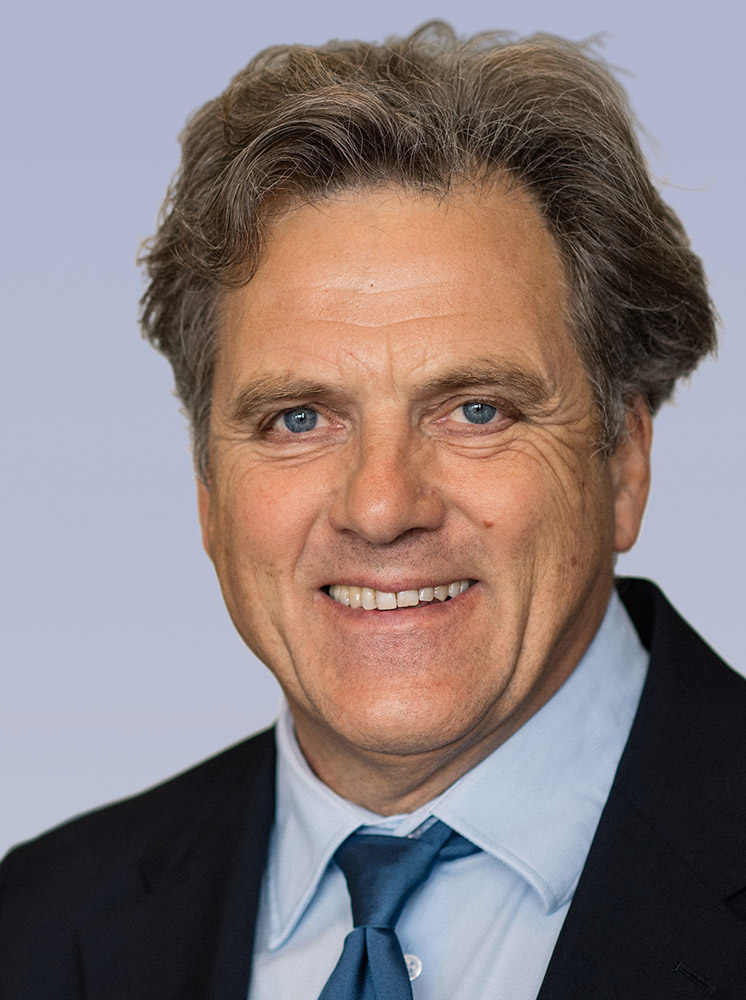Prof. Dr. rer. nat. Klaus B. Gerwert

Werdegang:
1985 Doctoral thesis in Biophysical Chemistry „Proton transfer in membrane proteins“, University of Freiburg, Germany. Supervisors: Prof. Dr. Josef Ackermann, Prof. Dr. Werner Kreuz
1986-1989 Postdoc, Max-Planck-Institute, Dortmund (Director B. Hess)
1990 „Visiting investigator“, Scripps Research Institute, La Jolla, USA
1990-1993 Heisenberg-fellow, Deutsche Forschungsgemeinschaft, Scripps Research Institute, La Jolla, USA, Molecular Biology Department (chairman Prof. Peter Wright) and MPI-Dortmund
1993 Habilitation thesis in Physical Chemistry „Molecular mechanism of Bacteriorhodopsin“, Bielefeld University, Germany. Mentor: Prof. Dr. Eberhard Neumann
Since 1993 Professor (W3) and chairman of the Department for Biophysics, Faculty for Biology and Biotechnology, Ruhr University Bochum, Germany
2008-2013 Director at the CAS (Chinese Academy of Sciences)-MPG (Max -Planck Society) Partner Institute for Computational Biology (PICB), SIBS, Shanghai, China
2008-2017 “Max-Planck-Fellow” at the Max-Planck-CAS Partner-Institute (PICB)
Since 2008 Principle Investigator at SIBS in Shanghai
Since 2019 Managing Founding Director of the research center for protein diagnostics (PRODI) of the Ruhr-University Bochum
Since 2020 CEO betaSENSE GmbH in part-time employment
Forschungsschwerpunkte:
Gerwert is actively advancing the development and application of time-resolved infrared difference spectroscopy in protein research. He is internationally recognized for his pioneering studies on protein reaction mechanisms, especially for his discovery of the catalytic role of internal water molecules in protein function. Recently, he invented quantum cascade laser-based IR imaging of cancer and brain tissue in combination with AI as a "label-free digital pathology" approach.
His current focus is on translation of the immuno-IR sensor he invented into the clinic. This approach uses the degree of misfolding of a biomarker as a measure instead of its concentration. This sensor measures the degree of misfolding of a biomarker instead of its concentration, enabling novel stratification of high-risk individuals for neurodegenerative diseases and personalized therapy.
Mitgliedschaften und Funktionen:
Since 2002 Faculty Member of the International Max-Planck Research School in Chemical Biology, Dortmund
Since 2009 Founding member and chairman, Protein Research Department, RUB
Since 2010 Founding member and chairman, PURE „Protein Research Unit Ruhr within Europe“
Since 2014 Founding director of the research center for protein diagnostics (ProDi) in Bochum
Since 2024 President of the Board of the German Society for Biophysics (DGfB)
Auszeichnungen und Ehrungen:
1990 Heisenberg fellow of the Deutsche Forschungsgemeinschaft
1992 Karl Arnold Jansen Award 1992 of the Rhine-Westphalian Academy of Sciences
2006 Innovation Award Ruhr 2006, Award of the prime minister of North Rhine-Westphalia, Alfried Krupp von Bohlen and Halbach foundation
20023 Innovation Award of the State of North Rhine-Westphalia
Ausgewählte Publikationen:
Lewy pathology in Parkinson’s disease consists of crowded organelles and lipid membranes; SH Shahmoradian, AJ Lewis, C Genoud, J Hench, TE Moors, PP Navarro, ...; Nature neuroscience 22 (7), 1099-1109.
Electrostatic calculations of the pKa values of ionizable groups in bacteriorhodopsin; D Bashford, K Gerwert; Journal of molecular biology 224 (2), 473-486.
Functional waters in intraprotein proton transfer monitored by FTIR difference spectroscopy; F Garczarek, K Gerwert; Nature 439 (7072), 109-112.
Role of aspartate-96 in proton translocation by bacteriorhodopsin.; K Gerwert, B Hess, J Soppa, D Oesterhelt; Proceedings of the National Academy of Sciences 86 (13), 4943-4947.
Simultaneous monitoring of light-induced changes in protein side-group protonation, chromophore isomerization, and backbone motion of bacteriorhodopsin by time-resolved Fourier …; K Gerwert, G Souvignier, B Hess; Proceedings of the National Academy of Sciences 87 (24), 9774-9778.
Link zur Liste der gesamten Publikationen:
http://www.prodi.rub.de/biospektroskopie/publikationen/